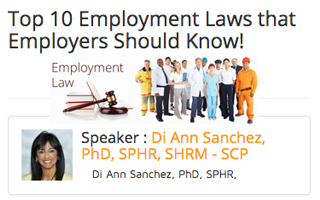
Employment law governs the rights and duties between employers and workers. Also referred to as labor law, these rules are primarily designed to keep workers safe and make sure they are treated fairly, although laws are in place to protect employers’ interests as well. Employment laws are based on federal and state constitutions, legislation, administrative rules, and court opinions.
Discrimination in the workplace is another basis for many employment law cases. The Civil Rights Act of 1964 and subsequent legislation makes it illegal to treat workers differently based on ethnicity, religious beliefs, gender, age, or disability.
Employers are required to understand the employment laws that govern their organizations. Several government agencies are involved in compliance of these employment laws.
Date: April 6, 2016
Time: 1:00 pm EST
Duration: 60 minutes
Speaker: Di Ann Sanchez, PhD, SPHR, SHRM-SCP
Registration: closed
Register today! Discounts available for multiple attendees!
Course Objective:
-
Unfair treatment because of race, color, religion, sex (including pregnancy), national origin, age (40 or older), disability or genetic information.
-
Harassment by managers, co-workers, or others in the workplace, because of race, color, religion, sex (including pregnancy), national origin, age (40 or older), disability or genetic information.
-
Denial of a reasonable workplace accommodation that the employee needs because of religious beliefs or disability.
-
Retaliation because the employee complained about job discrimination, or assisted with a job discrimination investigation or lawsuit.
Course Outline:
-
Basic review of the top 10 laws companies must comply
-
What liabilities do the managers have in applying these laws
-
Recognize the organizational watch outs
-
Understand the managers/supervisor responsibilities with the top 10
-
What are the government agencies looking out for your organizations?
-
Establishing what is FLSA
-
What is FMLA
-
What is covered under discrimination
-
What is USERRA
-
Do you have to comply with NLRA?
-
What is retaliation?
-
What is the Equal Pay Act and how has it changed
-
OSHA
-
I -9’s and E-verify
-
NLRA – what is it why should employers care?
-
Penalties for non-compliance
-
Establish best practices for reducing risks and correcting errors when using the new Form I-9
Target Audience:
-
Office Managers
-
Employers and Business owners
-
Human Resources Specialists
-
HR Managers
-
Risk managers
-
Attorneys
-
HR Supervisors
-
Controllers/ CFOs / Financial Managers
